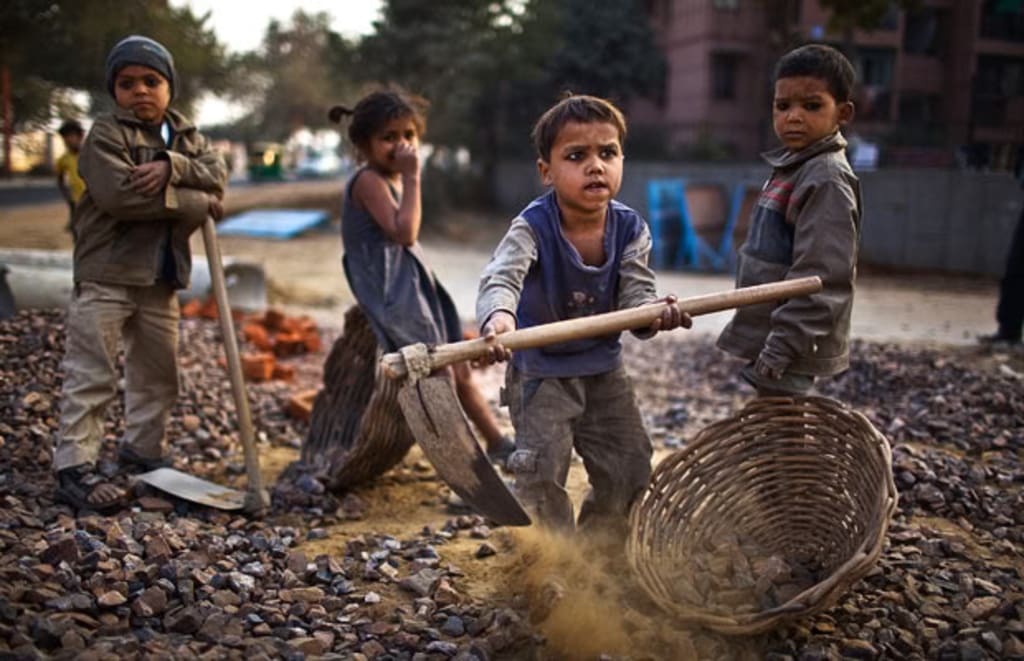Child Labour In Pakistan
Child labour increasing day by day due to poverty

Child labor is a significant social and economic problem in Pakistan, affecting millions of children in various industries. According to a report by the International Labor Organization (ILO), approximately 12.5 million children between the ages of 5 and 14 are involved in child labor in Pakistan, many of them working in hazardous conditions.
The problem of child labor in Pakistan is complex and multifaceted, with poverty and lack of education as the main causes. Many families in Pakistan cannot afford basic necessities such as food, shelter and education, so children are forced to work to support their families.
In addition, lack of access to education is a significant factor contributing to child labour. Children who cannot attend school are more likely to work in low-paid jobs, including agriculture, brickmaking and the textile industry. Children who work in these industries are often exposed to hazardous conditions, such as working with dangerous machinery and chemicals, which can lead to serious health problems.
The consequences of child labor in Pakistan are serious and far-reaching, affecting not only children but also their families and communities. Child labor leads to low educational attainment, perpetuates the cycle of poverty and limits opportunities for future economic growth. In addition, child labor can lead to physical and mental health problems, including malnutrition, injury and psychological distress.
The government of Pakistan has taken several steps to address the issue of child labour, including passing various laws and regulations to protect the rights of children. The Child Labor (Prohibition and Regulation) Act 2016 prohibits the employment of children under the age of 14 in any occupation, while the Child Labor Act 1991 prohibits the employment of children under the age of 15 in hazardous industries.
In addition, the government has established a National Child Labor Survey to collect data on child labor and monitor progress in addressing the issue. The government has also implemented various programs to provide education and training for children and families to improve their economic opportunities and reduce the need for child labor.
Non-Governmental Organizations (NGOs) have also played a key role in addressing the problem of child labor in Pakistan. Many NGOs provide education, training and other support services to children and families affected by child labour. In addition, these organizations advocate for policy changes and raise awareness about the consequences of child labor in Pakistan.
A comprehensive approach is necessary to effectively address the problem of child labor in Pakistan. Education is a key part of this approach, as it can help break the cycle of poverty and provide children with the skills and knowledge needed to secure better-paying jobs in the future.
Additionally, providing support services to families, such as access to health care, housing, and food, can help reduce the economic pressures that lead to child labor. Providing alternative income-generating opportunities for families can also help reduce the need for children to work.
Stronger enforcement of laws and regulations to protect children's rights and prevent child labor is also needed. Government and civil society organizations can work together to monitor workplaces and ensure that employers comply with child labor laws. In addition, there is a need to increase awareness and education about the dangers of child labor, especially in rural and marginalized communities.
In conclusion, child labor is a significant problem in Pakistan, affecting millions of children and perpetuating the cycle of poverty. Addressing this problem requires a comprehensive approach, including education, support services for families, opportunities to generate alternative incomes, and stronger enforcement of laws and regulations. By working together, government and civil society organizations can make a positive difference in the lives of children in Pakistan and help them create a better future.





Comments
There are no comments for this story
Be the first to respond and start the conversation.